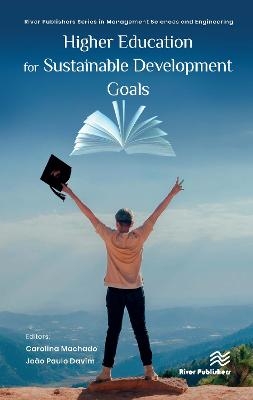
Higher Education for Sustainable Development Goals
River Publishers (Verlag)
978-87-7022-431-4 (ISBN)
This research book covers all aspects of higher education for sustainable development goals, namely, no poverty, zero hunger, good health and wellbeing, quality education, gender equality, clean water and sanitation, affordable and clean energy, decent work and economic growth, industry, innovation, and infrastructure, reduced inequalities, sustainable cities and communities, responsible consumption and production, climate action, life below water, life on land, peace, justice and strong institutions and partnerships.
Carolina Machado received her PhD degree in Management Sciences (Organizational and Policies Management area / Human Resources Management) from the University of Minho in 1999, Master degree in Management (Strategic Human Resource Management) from Technical University of Lisbon in 1994, and Degree in Business Administration from University of Minho in 1989. Teaching in the Human Resources Management subjects since 1989 at University of Minho, she is since 2004 Associated Professor, with experience and research interest areas in the field of Human Resource Management, International Human Resource Management, Human Resource Management in SMEs, Training and Development, Emotional Intelligence, Management Change, Knowledge Management and Management/HRM in the Digital Age/Business Analytics. She is Head of the Human Resources Management Work Group at the School of Economics and Management at University of Minho, Coordinator of Advanced Training Courses at the Interdisciplinary Centre of Social Sciences, Member of the Interdisciplinary Centre of Social Sciences (CICS.NOVA.UMinho), University of Minho, as well as Chief Editor of the International Journal of Applied Management Sciences and Engineering (IJAMSE), Guest Editor of journals, books Editor and book Series Editor, as well as reviewer in different international prestigious journals. In addition, she has also published both as editor/co-editor and as author/co-author several books, book chapters and articles in journals and conferences. João Paulo Davim is a Full Professor at the University of Aveiro, Portugal. He is also distinguished as honorary professor in several universities/colleges/institutes in China, India and Spain. He received his Ph.D. degree in Mechanical Engineering in 1997, M.Sc. degree in Mechanical Engineering (materials and manufacturing processes) in 1991, Mechanical Engineering degree (5 years) in 1986, from the University of Porto (FEUP), the Aggregate title (Full Habilitation) from the University of Coimbra in 2005 and the D.Sc. (Higher Doctorate) from London Metropolitan University in 2013. He is Senior Chartered Engineer by the Portuguese Institution of Engineers with an MBA and Specialist titles in Engineering and Industrial Management as well as in Metrology. He is also Eur Ing by FEANI-Brussels and Fellow (FIET) of IET-London. He has more than 30 years of teaching and research experience in Manufacturing, Materials, Mechanical and Industrial Engineering, with special emphasis in Machining & Tribology. He has also interest in Management, Engineering Education and Higher Education for Sustainability. He has guided large numbers of postdoc, Ph.D. and master’s students as well as has coordinated and participated in several financed research projects. He has received several scientific awards and honors. He has worked as evaluator of projects for ERC-European Research Council and other international research agencies as well as examiner of Ph.D. thesis for many universities in different countries. He is the Editor in Chief of several international journals, Guest Editor of journals, books Editor, book Series Editor and Scientific Advisory for many international journals and conferences. Presently, he is an Editorial Board member of 30 international journals and acts as reviewer for more than 100 prestigious Web of Science journals. In addition, he has also published as editor (and co-editor) more than 200 books and as author (and co-author) more than 15 books, 100 book chapters and 500 articles in journals and conferences (more than 300 articles in journals indexed in Web of Science core collection/h-index 61+/11500+ citations, SCOPUS/h-index 65+/14500+ citations, Google Scholar/h-index 83+/24500+ citations). He has listed in World´s Top 2% Scientists by Stanford University study.
1. Pedagogic Resonance and Threshold Concepts to Access the Hidden Complexity of Education for Sustainability, 2. Universities - Players in the Race for Sustainable Development, 3. Sustainability in Portuguese Higher Education Institutions, 4. Where is the Brazilian Higher Education Within the Sustainable Development Goal 4?, 5. Incorporating SDG 11 in Higher Education Teaching – The Relevance of Mobility on Sustainable Cities and Communities, 6. Push and Pull: Sustainability Education for 21st Century Engineers, 7. Unleashing Emotions: The Role of Emotional Intelligence Among Students in Upholding Sustainable Development Goals, 8. Pedagogy for Living in Harmony with Nature – Sustainability in Higher Education
| Erscheinungsdatum | 04.01.2022 |
|---|---|
| Zusatzinfo | 11 Tables, black and white; 5 Line drawings, color; 9 Line drawings, black and white; 16 Halftones, color; 21 Illustrations, color; 9 Illustrations, black and white |
| Verlagsort | Gistrup |
| Sprache | englisch |
| Maße | 156 x 234 mm |
| Gewicht | 521 g |
| Themenwelt | Naturwissenschaften ► Biologie ► Ökologie / Naturschutz |
| Sozialwissenschaften ► Pädagogik ► Erwachsenenbildung | |
| ISBN-10 | 87-7022-431-5 / 8770224315 |
| ISBN-13 | 978-87-7022-431-4 / 9788770224314 |
| Zustand | Neuware |
| Haben Sie eine Frage zum Produkt? |
aus dem Bereich


